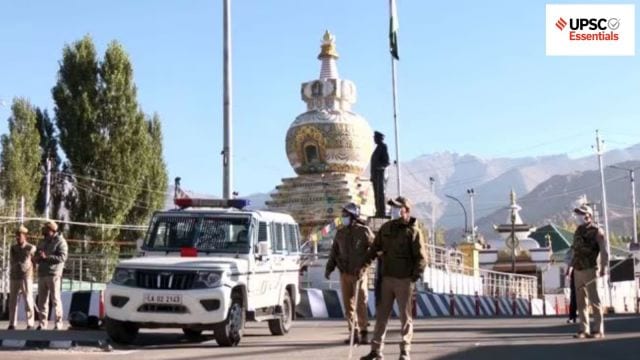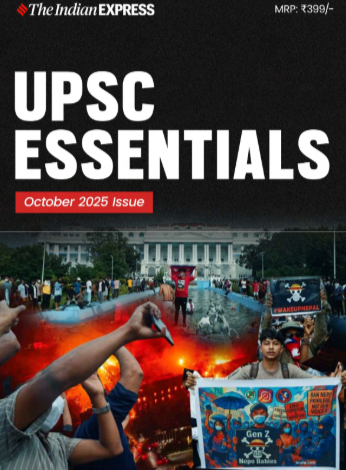© IE Online Media Services Pvt Ltd
Latest Comment
Post Comment
Read Comments
 Check your progress and revise your topics through this quiz on Polity and Governance. Find a question on the Article 371 in today's quiz. (Source: File)
Check your progress and revise your topics through this quiz on Polity and Governance. Find a question on the Article 371 in today's quiz. (Source: File)UPSC Essentials brings to you its initiative of daily subject-wise quizzes. These quizzes are designed to help you revise some of the most important topics from the static part of the syllabus. Attempt today’s subject quiz on Polity and Governance to check your progress.
🚨 Click Here to read the UPSC Essentials magazine for September 2025. Share your views and suggestions in the comment box or at manas.srivastava@indianexpress.com🚨
With reference to Article 371 of the Constitution of India, consider the following pairs:
| S. No. | Article | Provision related to |
| 1 | Article 371-A | Meghalaya |
| 2 | Article 371-C | Assam |
| 3 | Article 371-G | Mizoram |
| 4 | Article 371-H | Goa |
How many of the pairs given above are correctly matched?
(a) Only one
(b) Only two
(c) Only three
(d) All four
Explanation
— With the Ladakh groups seeking statehood for the Union Territory and insistent on its inclusion under the Sixth Schedule of the Constitution, sources in the central government said it was considering proposing other “constitutional safeguards” at the October 6 meeting, which could have included Article 371.
| S. No. | Article | Provision related to |
| 1 | Article 371-A | Nagaland |
| 2 | Article 371-C | Manipur |
| 3 | Article 371-G | Mizoram |
| 4 | Article 371-H | Arunachal Pradesh |
Therefore, option (a) is the correct answer.
With reference to the Forest Rights Act, consider the following statements:
1. It was enacted in 2008.
2. It seeks to recognise and vest forest rights in forest-dwelling Scheduled Tribes and other traditional forest dwellers.
3. The law provides only for living and does not allow them to cultivate forest land.
4. The act allows for the collection of minor forest produce.
How many of the statements given above are correct?
(a) Only one
(b) Only two
(c) Only three
(d) All four
Explanation
— Nearly 15% of all forest and community land claims under the Forest Rights Act (FRA), 2006, remain pending — with Telangana, Odisha, Assam, Gujarat and Maharashtra accounting for most cases — prompting the Ministry of Tribal Affairs (MoTA) to urge all states and Union Territories implementing the law to clear the backlog.
— The highest pendency was recorded in Telangana (3.29 lakh), followed by Odisha (1.20 lakh), Assam (96,000), Gujarat (84,000) and Maharashtra (28,000) as on May 31.
— Enacted in 2006, the FRA seeks to recognise and vest forest rights in forest-dwelling Scheduled Tribes and other traditional forest dwellers who have lived on such lands for generations but whose rights were never formally recorded. Hence, statement 1 is not correct and statement 2 is correct.
— The law provides for both individual rights — to live in and cultivate forest land for livelihood — and community rights, including grazing, collection of minor forest produce, and protection and regeneration of forest resources. Hence, statement 3 is not correct and statement 4 is correct.
Therefore, option (b) is the correct answer.
In which of the cases joint sitting of both houses is required?
1. If the Bill is rejected by the other House.
2. If more than six months elapse from the date of the reception of the Bill by the other House without the Bill being passed by it.
3. If the Houses disagree with the amendments to be made in the Bill.
Select the correct answer using the codes given below:
(a) 1 and 2 only
(b) 2 only
(c) 3 only
(d) 1, 2 and 3
Explanation
— Article 108 of the Constitution of India provides for joint sitting of both Houses in certain cases.
— If a bill has been passed by one House and transmitted to the other House—
(a) The other House rejects the Bill; or
(b) the Houses have finally differed on the amendments to be made in the Bill;
(c) more than six months elapse from the date of the receipt of the Bill by the other House without the Bill being passed by it, the President may, unless the Bill has elapsed due to a dissolution of the House of the People, notify the Houses by message if they are sitting or by public notification if they are not sitting, of his intention to summon them to meet in a joint sitting for the purpose of deliberating and voting on the Bill.
Therefore, option (d) is the correct answer.
(Other Source: Constitution of India)
Consider the following statements about the citizenship of India:
1. The provisions related to citizenship were put into effect after the Constitution of India came into effect.
2. The term citizenship is explicitly defined in the Constitution.
Which of the statements given above is/are correct?
(a) 1 only
(b) 2 only
(c) Both 1 and 2
(d) Neither 1 nor 2
Explanation
— At the start of this Constitution, every individual who has a habitation in the territory of India and —
(a) who was born in Indian territory; or
(a) either of whose parents were born in Indian territory; or
(c) who has been normally resided in Indian territory for at least five years immediately preceding such beginning.
— The Indian Constitution took effect on January 26, 1950. However, it is worth mentioning that the citizenship sections went into effect only on November 29, 1949, the day the Constitution was adopted. Hence, statement 1 is not correct.
— The term citizenship is not explicitly defined in the Constitution; Articles 5-11 outline the framework for citizenship at the time of the Constitution’s commencement. Hence, statement 2 is not correct.
Therefore, option (d) is the correct answer.
Consider the following statements:
1. A person who is arrested and detained in custody shall be produced before the nearest magistrate within a period of 24 hours of arrest.
2. The arrest includes the time necessary for the journey from the place of arrest to the court.
Which of the statements given above is/are correct?
(a) 1 only
(b) 2 only
(c) Both 1 and 2
(d) Neither 1 nor 2
Explanation
— No person who is arrested will be detained in custody without first being notified of the reasons for his arrest, nor may he be denied the right to speak with and be represented by a legal practitioner of his choosing.
— Every person arrested and detained in custody must be brought before the nearest magistrate within twenty-four hours of arrest, excluding the time required for the journey from the place of arrest to the magistrate’s court, and no such person may be held in custody for more than twenty-four hours without the authority of a magistrate. Hence, statement 1 is correct and statement 2 is not correct.
Therefore, option (a) is the correct answer.
(Other Source: Constitution of India)
Daily Subject-wise quiz — History, Culture, and Social Issues (Week 125)
Daily subject-wise quiz — Polity and Governance (Week 130)
Daily subject-wise quiz — Science and Technology (Week 130)
Daily subject-wise quiz — Economy (Week 130)
Daily subject-wise quiz — Environment and Geography (Week 130)
Daily subject-wise quiz – International Relations (Week 130)
Subscribe to our UPSC newsletter and stay updated with the news cues from the past week.
Stay updated with the latest UPSC articles by joining our Telegram channel – IndianExpress UPSC Hub, and follow us onInstagramand X.

Read UPSC Magazine




